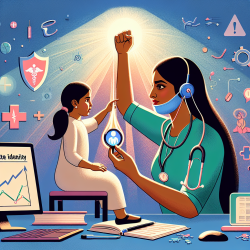Empowering Change: Harnessing Mobile Health for Refugee Youth
In the rapidly evolving landscape of global health, the need for innovative solutions to support vulnerable populations has never been more critical. The research article "Kukaa Salama (Staying Safe): a pre-post trial of an interactive informational mobile health intervention for increasing COVID-19 prevention practices with urban refugee youth in Uganda" provides a compelling case study on the potential of mobile health (mHealth) interventions. This blog explores how practitioners can leverage these insights to enhance their practice and drive positive outcomes for children, particularly in speech-language pathology and related fields.
Key Findings from the Kukaa Salama Study
The Kukaa Salama study employed an 8-week interactive mHealth intervention targeting urban refugee youth in Kampala, Uganda. Using the Risk, Attitude, Norms, Ability, Self-regulation (RANAS) framework, the intervention aimed to boost COVID-19 prevention practices. The study revealed significant improvements in self-efficacy, risk awareness, attitudes, and vaccine acceptance immediately following the intervention. However, these effects diminished over time, highlighting the need for sustained engagement strategies.
Applying Insights to Practice
Practitioners in speech-language pathology and other fields can draw valuable lessons from this study:
- Integrate mHealth Solutions: Consider incorporating mHealth tools to enhance communication and engagement with clients. Interactive platforms can facilitate ongoing support and education, particularly in resource-constrained settings.
- Focus on Sustained Engagement: The study underscores the importance of booster messaging and complementary programming to maintain behavior change. Practitioners should explore ways to provide regular follow-ups and reminders to reinforce learning.
- Leverage Data for Decision-Making: Utilize data-driven insights to tailor interventions to the specific needs of your clients. The RANAS framework offers a structured approach to understanding and influencing behavior change.
Encouraging Further Research
The Kukaa Salama study highlights the potential of mHealth interventions but also points to areas for further exploration. Researchers and practitioners are encouraged to investigate:
- The long-term impact of mHealth interventions on behavior change and health outcomes.
- Strategies for integrating mHealth with traditional therapeutic approaches.
- The role of mHealth in addressing broader social determinants of health, such as food and water security.
Conclusion
The Kukaa Salama study offers a promising glimpse into the future of health interventions for vulnerable populations. By embracing mHealth technologies and data-driven strategies, practitioners can enhance their practice and contribute to meaningful change in the lives of children and youth. As we continue to navigate the challenges of global health, let us remain committed to innovation and collaboration in our efforts to create better outcomes for all.
To read the original research paper, please follow this link: Kukaa Salama (Staying Safe): a pre-post trial of an interactive informational mobile health intervention for increasing COVID-19 prevention practices with urban refugee youth in Uganda.










